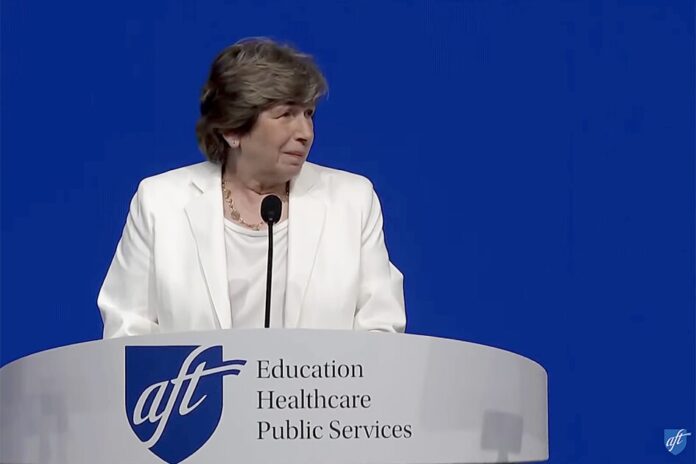In a move that has sent ripples through Democratic circles, Randi Weingarten, president of the American Federation of Teachers and a longtime influential figure within the Democratic National Committee, has announced her departure from the DNC. The decision, made public on June 15, 2025, follows a series of disagreements with newly appointed DNC Chair Ken Martin, marking one of the most significant leadership shakeups in the party’s recent history. Weingarten, who has been an at-large member of the DNC since 2002 and a key player on the Rules and Bylaws Committee since 2009, cited a fundamental misalignment with the direction of current party leadership as the reason for her resignation.
Weingarten’s exit is not just the loss of a high-profile member; it signals deeper internal discord at a time when the Democratic Party is seeking to unite ahead of a pivotal election cycle. Her letter to Martin, dated June 5, outlined her concerns about the party’s approach to broadening its outreach and engaging more communities, themes that have become central to her advocacy within the DNC.
The Departure: Why Randi Weingarten Left the DNC
Randi Weingarten’s resignation from the DNC did not come as a complete surprise to insiders. After backing Ben Wikler, chair of the Wisconsin Democratic Party, over Ken Martin in the recent DNC chairmanship election, Weingarten found herself increasingly at odds with the new leadership. Martin’s decision to remove her from the influential Rules and Bylaws Committee—a committee she had served on for over a decade—was seen as a tipping point.
In her resignation letter, Weingarten wrote, “I appear to be out of step with the leadership you are forging,” and expressed reluctance to continue questioning why the party was not doing more to broaden its tent and engage with a wider range of communities. Her departure follows that of David Hogg, the Gen Z activist and former DNC vice chair, who also left after clashing with Martin over progressive primary challenges. Weingarten had publicly defended Hogg, further highlighting the rift between her and the current DNC leadership.
The timing of her resignation, coinciding with nationwide protests and a heightened political atmosphere, has drawn criticism from some party strategists. However, others see it as a necessary moment of reckoning for the Democratic Party, which is grappling with how to balance internal unity with the need to address the concerns of its diverse coalition.
The Impact of Randi Weingarten’s Exit
Randi Weingarten’s departure from the DNC is more than a personnel change; it reflects broader tensions within the Democratic Party. As the head of a union representing 1.7 million educational professionals, her influence extends far beyond the committee room. Her advocacy for teachers, public education, and progressive causes has made her a central figure in labor and Democratic politics.
Her exit raises questions about the party’s ability to retain the support of key constituencies, particularly labor unions and progressive activists. The removal of Weingarten from the Rules and Bylaws Committee, a body responsible for shaping the party’s presidential nomination process, also signals a shift in how the DNC may approach future elections.
Supporters of Weingarten argue that her willingness to challenge leadership and push for greater inclusivity is exactly what the party needs. Critics, however, contend that internal dissent can weaken the party at a time when unity is essential. Regardless of perspective, her resignation underscores the ongoing debate within the Democratic Party about its direction and priorities.
What Comes Next for Randi Weingarten and the DNC
Randi Weingarten’s resignation does not mean she is stepping away from public life or activism. As president of the American Federation of Teachers, she remains one of the most powerful voices in American labor and education. Her decision to leave the DNC may allow her to focus even more intently on advocating for teachers, students, and progressive causes outside the confines of party politics.
For the DNC, her departure is a call to reflect on how it engages with its members and the broader public. The party is at a crossroads, facing pressure to address internal divisions while also preparing for upcoming elections. The loss of a seasoned leader like Weingarten could prompt a reassessment of how the DNC builds coalitions and communicates with its supporters.
The coming months will be critical for both Weingarten and the DNC. Will the party take steps to address the concerns raised by its departing members? Or will it double down on its current path? These questions will shape the future of Democratic politics in America.
Engaging with the Future
Randi Weingarten’s decision to quit the DNC post is a reminder that even the most established organizations must evolve to stay relevant. Her call for broader outreach and deeper community engagement is a challenge not just for the DNC, but for all who believe in the power of inclusive politics. As the party looks ahead, it must find ways to unite its diverse base and address the concerns of leaders like Weingarten, who have dedicated decades to advancing progressive causes.
For readers who care about the future of the Democratic Party and the role of labor in American politics, now is the time to get involved. Stay informed, share your views, and support leaders who champion inclusivity and progress.
